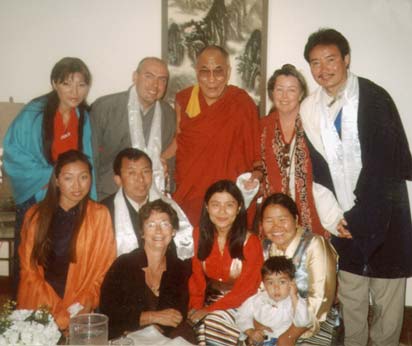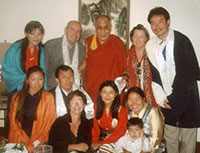17th Annual Tibet Day Report
Congressional Recognition among Highlights of Bay Area Friends of Tibet's Tibetan Cultural Celebration
by Giovanni Vassallo
SAN FRANCISCO, CA., October 26, 2002 – Bay Area Friends of Tibet (BAFoT) received congressional recognition at Fort Mason Conference Center by the San Francisco waterfront at its 17th Annual Tibet Day. Though by some attendee’s accounts the city’s largest peace rally held downtown the same day to stop an apparent impending U.S.-led military action against Iraq, cut into the expected attendance, the long-planned Oct. 26 event’s turnout was one of the best ever in the organization’s history. The occasion combined BAFoT’s annual fundraiser with numerous impressive Tibetan cultural song or dance performances by various groups with over 30 tables in a large room showcasing Tibetan or Himalayan merchandise for sale by several local Tibet shops and vendors. These activities, daylong showings of Tibet-related movies, serving of delicious Tibetan food such as momos, Tibet Support Group tables and an exceptional panel discussion on “ How to Free Tibet” kept three large conference rooms and parts of the center’s parking lot busy and filled with about 500 participants throughout the course of the day.
BAFoT Secretary Giovanni Vassallo began the event by first informing the gathering that California Governor Gray Davis’s had “sent his best personal wishes for the success of the event.” Then a somber note was touched when he announced the bad news that Senator Paul Wellstone of Minnesota, a staunch Friend of Tibet, had died in a plane crash the day before. The Senator sponsored many bills in Congress in support of Tibet and introduced Senate Resolution 252 marking the 13th birthday of the detained Panchen Lama and calling for his release. Vassallo led a moment of silence in honor of the respected Tibet supporter. This was followed by prayers and blessing by Rinpoche Lama Kunga of Ewam Choden Tibetan Buddhist Center and then Lama Lodru Rinpoche of Kagyu Droden Kunchab. Subsequent entertainers and performers then began to light the stage of the main conference room as people increasingly began to fill the room, became spectators or began shopping and as delightful Tibetan music permeated throughout conference center. Movies and a slide show began in the other rooms and were watched by several attendees.
About midday, Dan Bernal, U.S. Congresswoman Nancy Pelosi’s Deputy District Director on the Congresswoman’s behalf, read her statement. Congresswoman Nancy Pelosi, House Democratic Whip, said that the recent releases of Tibetan political prisoners and the visit of the Dalai Lama's envoys to Beijing are cause for cautious hope for the Tibetan people. Pelosi also cautioned that it would be wrong to be too optimistic at this stage, as this is not the first time that China has hinted that it might relent on the Tibet issue.
Pelosi said the plight of the people of Tibet is a challenge to the global conscience and that she will continue to support the aspirations of the Tibetan people to preserve their heritage and regain their freedom.
She said it was due to continued pressure from the Congress and from concerned citizens that President Bush raised the issue of Tibet with President Jiang Zemin in their meeting on October 25, 2002. Pelosi said that she hoped President Bush would make self-determination for Tibetans a priority in the U.S.-China relationship.
Pelosi’s statement ended with "Thank you for your continued activism for the people of Tibet. Your actions, words and prayers will move mountains. Please be assured I will continue to support the aspirations of the Tibetan people to preserve their heritage and regain their freedom."
Shortly after the Congresswoman statement, Bernal then presented an award, a Certificate of Special Congressional Recognition, to Bay Area Friends of Tibet’s President Diane Hume to honor the organization’s “outstanding and invaluable support to the community.” It was signed by Congresswoman Pelosi and according to Mr. Bernal, awarded to BAFoT “to also honor all the Bay Area Tibet groups including the Tibetan Association of Northern California, the San Francisco Bay Area Tibetan Youth Congress, the Committee of 100 for Tibet, the Tibet Justice Center and the Tibetan Nuns Project.”
Later in the day, the panel discussion went exceptionally well. Panelists included Kasur Tenzin Tethong, Chairman of the Committee of 100 for Tibet, Heidi Basch from University of California, Berkeley Students for a Free Tibet, Margery Farrar, Human Rights Special Assistant to U.S. Congressman Tom Lantos, Eva Herzer, former President of the Tibet Justice Center and Topden Tsering, President of the Tibetan Youth Congress. Some interesting quotes include one from Tenzin Tethong “It’s time to focus on the people in Tibet and on right of the Tibetan people to self-determination. The Self-Determination Initiative does not take away from anyone’s campaign. It can help move the Tibet issue along. It is something that can unify the various different messages from different groups and puts the focus back where it should be, whatever choice of the Tibetan people in Tibet.”
Eva Herzer said that “it is important to realize what we can effectively achieve which is why Tibet Justice has led several different workshops for the Tibetan Government-in-Exile to educate Tibetans on the various forms of genuine autonomy available to them.” She pointed out that the right to self-determination is an under-lying principle of international law.
In contrast, Topden Tsering said that most Tibetans want independence therefore it is clear that that is what we should still demand from the Chinese government. Later, he also said that “the individual campaigns for Tibet have been working. We have seen the releases of several Tibetan political prisoners and it is important to keep up these campaigns. What we need is movement on the Tibetan issue.”
Heidi Basch stressed that we needed to move forward with the economic campaigns against the PRC such as “SFT’s call to boycott ExxonMobil.”
Margery Farrar pointed out the significance of the recent Tibet Policy Act introduced by Congressman Lantos, passed by Congress and signed into law by President Bush. “This Act may not be the best plan, but it is the best blueprint out there of what we should continue to do for Tibet.”
“The panelists were articulate, interesting and diverse,” said one of the panel's audience members. “…it couldn't have gone better. We got to hear different sides of the issue.”
Other highlights of the event, entitled “Tales of Tibet” also included several Tibetans who gave renditions of various Tibetan folk stories or recommendations of Tibetan literature. Several performance artists from the Chaksampa Tibetan Dance Opera and Semshug Pundha and other Bay Area Tibetan Dance groups continued to delight participants throughout the day with special performances. The day concluded with a raffle and a vote of thanks by the organizers.
According to Karma, one of the Tibetan vendors, the celebration was “a great combination of Rinpoches, Politicians, Dancers, Vendors, Students, Tibet supporters and wellwishers all coming to making it what it should be, a great day.”




